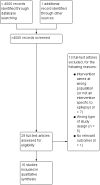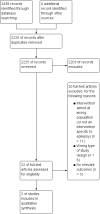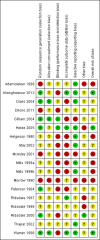Care delivery and self management strategies for adults with epilepsy
- PMID: 26842929
- PMCID: PMC7390263
- DOI: 10.1002/14651858.CD006244.pub3
Care delivery and self management strategies for adults with epilepsy
Abstract
Background: Researchers have criticised epilepsy care for adults for its lack of impact, stimulating the development of various service models and strategies to respond to perceived inadequacies.
Objectives: To assess the effects of any specialised or dedicated intervention beyond that of usual care in adults with epilepsy.
Search methods: For the latest update of this review, we searched the Cochrane Epilepsy Group Specialized Register (9 December 2013), the Cochrane Central Register of Controlled Trials (CENTRAL) (2013, Issue 11), MEDLINE (1946 to June 2013), EMBASE (1988 to June 2013), PsycINFO (1887 to December 2013) and CINAHL (1937 to December 2013). In addition, we contacted experts in the field to seek information on unpublished and ongoing studies, checked the websites of epilepsy organisations and checked the reference lists of included studies.
Selection criteria: We included randomised controlled trials, controlled or matched trials, cohort studies or other prospective studies with a control group, and time series studies.
Data collection and analysis: Two review authors independently selected studies, extracted all data, and assessed the quality of all included studies.
Main results: Our review included 18 different studies of 16 separate interventions, which we classified into seven distinct groups. Most of the studies have methodological weaknesses, and many results from other analyses within studies need to be interpreted with caution because of study limitations. Consequently, there is currently limited evidence for the effectiveness of interventions to improve the health and quality of life in people with epilepsy. It was not possible to combine study results in a meta-analysis because of the heterogeneity of outcomes, study populations, interventions and time scales across the studies.
Authors' conclusions: Two intervention types, the specialist epilepsy nurse and self management education, have some evidence of benefit. However, we did not find clear evidence that other service models substantially improve outcomes for adults with epilepsy. It is also possible that benefits are situation specific and may not apply to other settings. These studies included only a small number of service providers whose individual competence or expertise may have had a significant impact on outcomes. At present it is not possible to advocate any single model of service provision.
Conflict of interest statement
PB: None known.
BL: None known.
NF: None known.
Figures




Update of
-
Care delivery and self-management strategies for adults with epilepsy.Cochrane Database Syst Rev. 2008 Jan 23;(1):CD006244. doi: 10.1002/14651858.CD006244.pub2. Cochrane Database Syst Rev. 2008. Update in: Cochrane Database Syst Rev. 2016 Feb 04;2:CD006244. doi: 10.1002/14651858.CD006244.pub3. PMID: 18254097 Updated.
References
References to studies included in this review
Adamolekun 1999 {published data only}
-
- Adamolekun B, Mielke JK, Ball DE. An evaluation of the impact of health worker and patient education on the care and compliance of patients with epilepsy in Zimbabwe. Epilepsia 1999;40(4):507‐11. - PubMed
Aliasgharpour 2013 {published data only}
-
- Aliasgharpour M, Dehgahn Nayeri N, Yadegary MA, Haghani H. Effects of an educational program on self‐management in patients with epilepsy. Seizure 2013;22(1):48‐52. - PubMed
Davis 2004 {published data only}
-
- Davis J, Roberts R, Davidson DLW, Norman A, Ogston S, Grimshaw JM, et al. Implementation strategies for a Scottish National Epilepsy Guideline in primary care: results of the Tayside Implementation of Guidelines in Epilepsy Randomized (TIGER) Trial. Epilepsia 2004;45(1):28‐34. - PubMed
DiIorio 2011 {published data only}
-
- DiIorio C, Bamps Y, Walker ER, Escoffery C. Results of a research study evaluating WebEase, an online epilepsy self‐management program. Epilepsy and Behavior 2011; Vol. 22, issue 3:469‐74. - PubMed
Gilliam 2004 {published data only}
-
- Gilliam FG, Fessler AJ, Baker G, Vahle V, Carter J, Attarian H. Systematic screening allows reduction of adverse antiepileptic drug effects: a randomized trial. Neurology 2004;62(1):6‐7. - PubMed
Helde 2005 {published data only}
-
- Helde G, Bovim G, Bråthen G, Brodtkorb E. A structured, nurse‐led intervention program improves quality of life in patients with epilepsy: a randomized, controlled trial. Epilepsy and Behavior 2005;7:451‐7. - PubMed
Helgeson 1990 {published data only}
-
- Helgeson DC, Mittan R, Tan SR, Chayasirisobhon S. Sepulveda Epilepsy Education: the efficacy of a psychoeducational treatment programme in treating medical and psychosocial aspects of epilepsy. Epilepsia 1990;31(1):75‐82. - PubMed
May 2002 {published data only}
-
- May TW, Pfäfflin M. The efficacy of an educational treatment program for patients with epilepsy (MOSES): results of a controlled, randomized study. Epilepsia 2002;43(5):539‐49. - PubMed
McAuley 2001 {published data only}
-
- McAuley JW, Long L, Heise J, Kirby T, Buckworth J, Pitt C, et al. A prospective evaluation of the effects of a 12‐week outpatient exercise program on clinical and behavioral outcomes in patients with epilepsy]. Epilepsy and Behavior 2001;2:592‐600. - PubMed
Mills 1999a {published data only}
-
- Mills N, Bachmann MO, Harvey I, McGowan M. Effect of a primary care‐based epilepsy specialist nurse service on quality of care from the patient's perspective: quasi‐experimental evaluation. Seizure 1999;8(1):1‐7. - PubMed
Mills 1999b {published data only}
-
- Mills N, Bachmann MO, Campbell R, Hine I, McGowan M. Effect of a primary care based epilepsy specialist nurse service on quality of care from the patients' perspective: results at two‐years follow‐up. Seizure 1999;8(5):291‐6. - PubMed
Morrow 1990 {published data only}
-
- Morrow J. An assessment of an epilepsy clinic. In: Chadwick D editor(s). Quality of life and quality of care in epilepsy. London: Royal Society of Medicine, 1990:96‐105.
Peterson 1984 {published data only}
-
- Peterson GM, McLean S, Millingen KS. A randomised trial of strategies to improve patient compliance with anticonvulsant therapy. Epilepsia 1984;25(4):412‐7. - PubMed
Ridsdale 1997 {published data only}
Ridsdale 1999 {published data only}
Ridsdale 2000 {published data only}
-
- Ridsdale L, Kwan I, Cryer C. Newly diagnosed epilepsy: can nurse specialists help? A randomized controlled trial. Epilepsia 2000;41(8):1014‐9. - PubMed
Thapar 2002 {published data only}
Warren 1998 {published data only}
-
- Warren E. An evaluation of a Nurse Specialist/Case Manager intervention in the management of epilepsy. Report for the North West Regional Health Authority R&D Directorate 1998.
References to studies excluded from this review
Ball 2000 {published data only}
-
- Ball DE, Mielke J, Adamolekun B, Mundanda T, McLean J. Community leader education to increase epilepsy attendance at clinics in Epworth, Zimbabwe. Epilepsia 2000;41(8):1044‐5. - PubMed
Becú 1993 {published data only}
-
- Becú M, Becú N, Manzur G, Kochen S. Self‐help epilepsy groups: an evaluation of effect on depression and schizophrenia. Epilepsia 1993;34(5):841‐5. - PubMed
DiIorio 2009 {published data only}
-
- DiIorio C, Reisinger EL, Yeager KA, McCarty F. A telephone‐based self‐management program for people with epilepsy. Epilepsy and Behavior 2009; Vol. 14, issue 1:232‐6. - PubMed
Fraser 1984 {published data only}
-
- Fraser RT, Trejo W, Blanchard W. Epilepsy rehabilitation: evaluating specialized versus general agency outcome. Epilepsia 1984;25(3):332‐7. - PubMed
Lundgren 2006 {published data only}
-
- Lundgren T, Dahl J, Melin L, Kies B. Evaluation of acceptance and commitment therapy for drug refractory epilepsy: a randomized controlled trial in South Africa‐‐a pilot study. Epilepsia 2006; Vol. 47, issue 12:2173‐9. - PubMed
Lundgren 2008 {published data only}
-
- Lundgren TB, Dahl J, Yardi N, Melin N. Acceptance and Commitment Therapy and yoga for drug‐refractory epilepsy: a randomized controlled trial. Epilepsy and Behavior 2008;13(1):102‐108. - PubMed
Ogata 2000 {published data only}
-
- Ogata A, Amano K. A psychosocial approach to epileptic patients. Epilepsia 2000;41(Suppl 9):36‐8. - PubMed
OREp 1997 {published data only}
-
- Osservatorio Regionale per l'Epilessia (OREp), Lombardy. The contribution of tertiary centers to the quality of the diagnosis and treatment of epilepsy. Epilepsia 1997;38(12):1338‐43. - PubMed
Pramuka 2007 {published data only}
-
- Pramuka M, Hendrickson R, Zinski A, Cott AC. A psychosocial self‐management program for epilepsy: a randomized pilot study in adults. Epilepsy and Behavior 2007; Vol. 11, issue 4:533‐45. - PubMed
Rasmusson 2005 {published data only}
-
- Rasmusson KA, Hartshorn JC. A comparison of epilepsy patients in a traditional ambulatory clinic and a telemedicine clinic. Epilepsia 2005;46(5):767‐70. - PubMed
Sarkissian 1999 {published data only}
-
- Sarkissian S, Wennberg R. Effects of the acute care nurse practitioner role on epilepsy monitoring outcomes. Outcomes Management for Nursing Practice 1999;3(4):161‐6. - PubMed
Additional references
Austin 1997
-
- Austin JK, Boer H. Disruption in social functioning and services facilitating adjustment for the child and adult with epilepsy. In: Engel J, Pedley T editor(s). Epilepsy: A Comprehensive Textbook. Philadelphia: Lippincott‐Raven, 1997:191‐201.
Bandstra 2008
-
- Bandstra N, Camfield C, Camfield P. Stigma of epilepsy. Canadian Journal of Neurological Sciences 2008;35(4):436–40. - PubMed
Berg 2010
-
- Berg AT, Berkovic SF, Brodie MJ, Buchhalter J, Cross JH, Emde Boas W, et al. Revised terminology and concepts for organization of seizures and epilepsies: report of the ILAE Commission on Classification and Terminology, 2005‐2009. Epilepsia 2010;51(4):676‐85. - PubMed
Betts 1992
-
- Betts T. Epilepsy services. What people need, what they want, what they get. Acta Neurologica Scandinavica Supplementum 1992;140:95‐100. - PubMed
Chappell 1992
-
- Chappell B. Epilepsy: patient views on their condition and treatment. Seizure 1992;1(2):103‐9. - PubMed
Clark 2008
-
- Clark NM, Cabana MD, Nan B, Gong ZM, Slish KK, Birk NA, et al. The clinician‐patient partnership paradigm: outcomes associated with physician communication behavior. Clinical Pediatrics 2008;47(1):49‐57. - PubMed
Clark 2010
-
- Clark NM, Stoll S, Youatt EJ, Sweetman M, Derry R, Gorelick A. Fostering epilepsy self management: the perspectives of professionals. Epilepsy Behavior 2010;19(3):255‐63. - PubMed
Elwyn 2003
England 2012
Fitzsimons 2012
-
- Fitzsimons M, Normand C, Varley J, Delanty N. Evidence‐based models of care for people with epilepsy. Epilepsy and Behavior 2012;23(1):1‐6. - PubMed
Higgins 2011
-
- Higgins JPT, Green S (editors). Cochrane Handbook for Systematic Reviews of Interventions Version 5.1.0 [updated March 2011] The Cochrane Collaboration, 2011. Available from www.cochrane‐handbook.org.
Lindsay 2015
Mittan 2009
-
- Mittan RJ. Psychosocial treatment programs in epilepsy: a review. Epilepsy and Behavior 2009;16(3):371‐80. - PubMed
Sander 1990
-
- Sander JW, Hart YM, Johnson AL, Shorvon SD. National General Practice Study of Epilepsy: newly diagnosed epileptic seizures in a general population. The Lancet 1990;336(8726):1267‐71. - PubMed
SIGN 2003
-
- Scottish Intercollegiate Guidelines Network (SIGN). Diagnosis and management of epilepsy in adults: A national clinical guideline (no. 70). Edinburgh: Scottish Intercollegiate Guidelines Network, Royal College of Physicians, 2003.
SIGN 2005
-
- Scottish Intercollegiate Guidelines Network (SIGN). Diagnosis and Management of Epilepsies in Children and Young People: A National Clinical Guideline (no. 81). Edinburgh: Scottish Intercollegiate Guidelines Network, 2005.
Thapar 1996
WHO 2012
-
- World Health Organization. WHO, Fact sheet 999, Epilepsy. www.who.int/mediacentre/factsheets/fs999/en/index.html (accessed: 16 December 2013).
Publication types
MeSH terms
Grants and funding
LinkOut - more resources
Full Text Sources
Other Literature Sources
Medical

